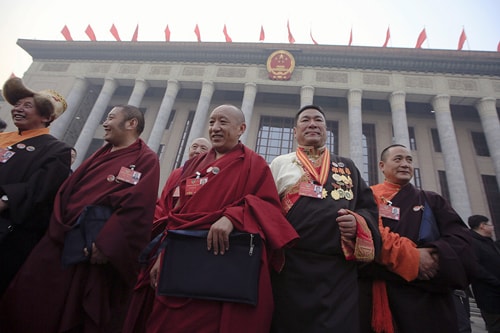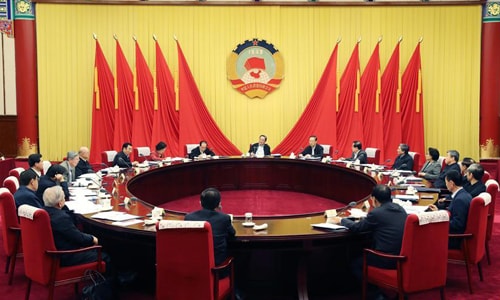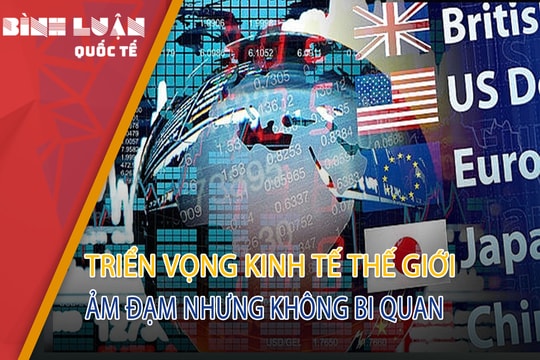China's nine-party political system of 'sharing glory and shame'
In addition to the ruling Communist Party, China's political system also has eight other officially recognized democratic parties.
China's nine-party political system. Video: CGTN.
"We will strive to build a beautiful China, devote our strength and wisdom to building a prosperous society in all fields and win new victories for socialism with Chinese characteristics," Chen Zhu, chairman of the Workers' and Peasants' Democratic Party of China, said at a press conference held at the Great Hall of the People in Beijing in 2013, according to the NYTimes.
Chen is one of the leaders of eight active political parties recognized by the ruling Communist Party of China. At the press conference, the party chairmen took turns praising the country's economic achievements, the leaders' commitment to environmental protection and, above all, the perfection of the one-party system.
These parties include the Chinese Nationalist Revolutionary Committee (KMT), the China Democratic League (DLD), the China Democratic National Construction Association (DLD), the China Society for Promoting Democracy (DLD), the Chinese Peasants and Workers' Democratic Party (Peasants and Workers' Democratic Party), the Chinese Zhigong Party (Zhigong Party), the Jiu San Society, and the Taiwan Democratic Self-Government League (Tai Ming).
According to CRI, most of these parties were founded during China's war of resistance against Japan and supported the Communist Party of China (CPC) in its fight against the Kuomintang in the late 1940s.
These democratic parties are independent organizations, enjoy political freedom, organizational autonomy, and are recognized as legal entities in the constitution. These eight parties cooperate with the CPC on the principle of "long-term coexistence, mutual supervision, sincere treatment, and mutual honor and disgrace."
When the People's Republic of China was founded, one or two representatives of these parties held key positions in the government and wielded real power, said Diplomat writer Mu Chunshan. For example, Shen Junru, the first president of the Supreme Court of China, was the chairman of the Democratic Party, one of the eight democratic parties in the country.
During the Cultural Revolution, however, these parties existed in name only. It was only when Deng Xiaoping came to power and sought to restore the Communist Party’s tradition of accepting criticism that they began to be taken seriously. From 170,000 members in the mid-1980s, the membership of these eight parties has now grown to more than 840,000.
The leaders of the eight parties are allowed to participate in the National People's Congress and the Chinese People's Political Consultative Conference, although they no longer hold the actual power as the first president of the Supreme Court. Nevertheless, the Chinese Communist Party still shows great respect for these parties, demonstrated by its willingness to discuss major issues and seek their opinions.
 |
Delegates attend the political consultative conference in Beijing. Photo: Chinanews. |
In essence, these eight parties are not opposition parties to the CPC, but rather, they play a cooperative role, providing different voices and suggestions from other aspects of society to help the CPC in its governance process. Although they cannot put their candidates in government positions, their activities are funded by the CPC. This is considered a "unique" political model in the world.
Some argue that the existence of these parties is purely symbolic and that they have no role in Chinese society or politics. “They are just fake parties, created to give people a sense of benefit,” said Jin Zhong, editor-in-chief of Open magazine in Hong Kong. “People who join these parties have the illusion that they can influence the Communist Party.”
But such assessments are disputed by the leaders of these parties themselves. They argue that such a political system works very effectively, providing the government with concrete proposals and sound advice from outside the Communist Party.
Wan Exiang, chairman of the Democratic Party, said thatThe Chinese people's desire for development and stability has been tied to one-party rule. "We had more than 300 parties in the early days of the Republic of China, and the result was infighting between political parties and warlords, which led to a split in the country," Wan said. "China would never have achieved the economic success it has today if it had kept that political system."
These parties also have their own active activities. They raise money for student scholarships, research social issues, and issue detailed reports to the Chinese People's Political Consultative Conference, such as a proposal to preserve historical war relics in Chongqing or a call for improved ophthalmology services for people in western China.
Zhou Zhongxiao, 30, who runs an online dating website in Beijing, said joining the Minming party has helped him promote his project to preserve traditional Chinese marriage rituals. “Our useful work is to help the ruling party lead the country,” Zhou said. “A political party does not necessarily always seek power.”
 |
A meeting of leaders of the Chinese People's Political Consultative Conference. Photo: Chinanews. |
Joining these parties is not easy. Interested members must be recommended by at least two party members, but most importantly they must be from China’s intellectual or business elite. Becoming a member of these parties offers significant career advancement opportunities and can even get into the Chinese People’s Political Consultative Conference in Beijing, according to Joseph Cheng, a political scientist at the City University of Hong Kong.
A friend of Mu Chunshan said that in his company, members of a democratic party are given priority for promotion, second only to those of the Communist Party. The company requires a certain percentage of democratic party members on the board of directors, which means he has a higher chance of getting into this position, when all other positions are already occupied by Communist Party members.
Wang Tongchun, a businessman in Jiangsu, said he was admitted to the Minjian Party for a $16 annual fee, "in return for which you have social status and a sense of belonging to something."
According to VNE
| RELATED NEWS |
|---|



